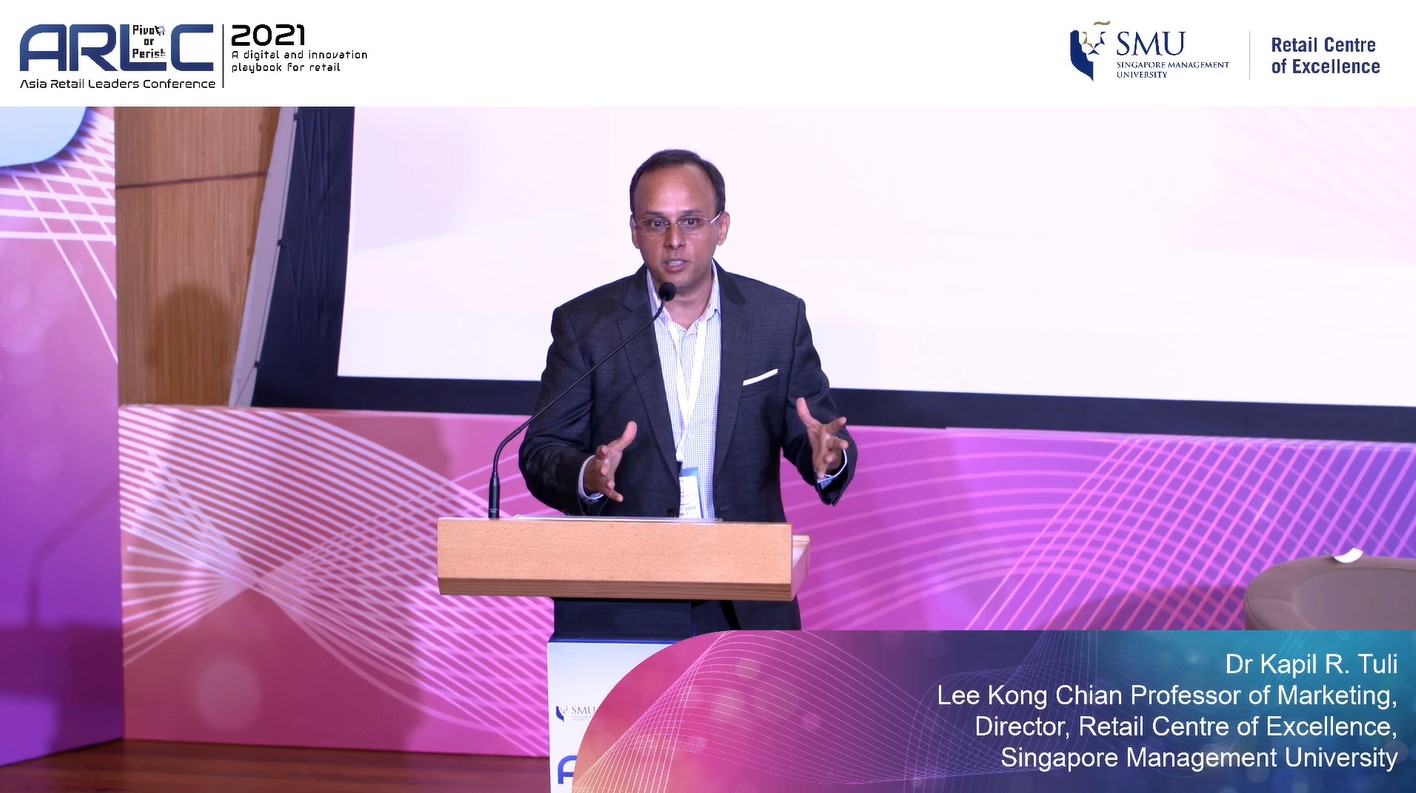
The third Asia Retail Leaders Conference (ARLC) was organized by Singapore Management University (SMU)’s Retail Centre of Excellence (RCoE) on 17 November, bringing together APAC's leading retail startups, corporates, policy makers, industry leaders, and investors. Themed ‘Pivot or Perish’, ARLC 2021 aims to address the challenges faced by the retail industry as they seek to adapt to the impact of the pandemic.
The full day hybrid conference revolved around the current developments and challenges faced by the retail industry, such as prolonged and rising disruptions to businesses from the pandemic, changing consumer behaviour and technological innovations. Dean of SMU Lee Kong Chian School of Business, Professor Bert De Reyck delivered the Welcome Address and twelve industry experts from the academic and retail spheres shed light on the critical relationship between digital transformation, consumer trends, and issues such as sustainability, in empowering retailers and attendees to thrive in the post-pandemic world.
Professor of Marketing, Kapil Tuli, Director of the Retail Centre of Excellence said, “The retail industry has been severely impacted by the pandemic despite some signs of recovery being reported. However, our retail space plays a significant role in shaping Singapore’s status as a global trade hub, and its vibrancy is crucial to support other major sectors of Singapore’s economy. We are excited to partner with the Economic Development Board (EDB), Enterprise Singapore, and Singapore Tourism Board’s “Made with Passion” brands to bring key stakeholders in retail together to help drive the industry forward and tackle the pressing challenges faced by Singapore’s retail segment.”
Consumers have become more aware of retailers’ impact on sustainability and increasingly consider a brand’s values when making their purchasing decision. It was a discussion point that Ms Nejla Matam-Finn, Co-founder of THE FIFTH COLLECTION weighed in on. She said, “The adoption of the second-hand economy has the potential of becoming bigger than fast fashion, as more people are going to be transacting higher values in second-hand clothing.” She further highlighted that “Sustainability is not a choice anymore. It is going to happen when the resale industry surfaces in the fast fashion industry”.
Technology that is aiding retailers to develop cost-effective omnichannel touchpoints with their customers has also emerged as a critical factor to succeed in the rapidly evolving futuristic retail ecosystem. With the consumer behaviour changed as a result of the pandemic, progressive technologies such as Augmented Reality (AR) and Artificial Intelligence (AI) have significantly altered the way brands engage with their consumers. “The shift to digital is here to stay and retailers should treat social channels like flagship stores. The role of store and online have blurred, which means retailers should bring the store experience online and the convenience of digital to stores,” said Ms Via Abano, Product Marketing Manager, CPG and Retail, Facebook APAC.
The pandemic has also brought on further challenges to retailers, such as disruptions to the supply chain, leading brands to rejig their production and fulfilment operations in order to meet burgeoning demands. “We are seeing many brands having a higher degree of flexibility, which allows production in much smaller batches, while ensuring a higher level of proximity between the supply chain and the local market, highlighted SMU Professor of Operations Management, Shantanu Bhattacharya. He added how “it’s made planning and scheduling of inventory more dynamic when compared to static supply chain policies in the past. Usage of text analytics and social media has converged with trending keywords and products linked to those keywords, identified and mapped in real time”.
Beyond usage of social channels for advertisements, brands and retailers have expanded their touch points to sell directly to consumers and engage with them to build trust and loyalty. “Digital commerce has rapidly accelerated and will continue to evolve and expand beyond what we can imagine as consumers continue to have a higher baseline expectation” said Mr Peng Chun Hsien, Vice President, Merchant Sales & Acquiring, Asia Pacific, Visa Worldwide, “Businesses that go the extra mile by providing a delightful fulfilment experience will deliver something that customers all look for in the long run.”
Concluding the conference was the finals of the Inter-Varsity Retail Challenge which saw over 40 submissions from Singapore’s local universities. The top three teams presented their case study and proposals to the judges, tackling issues facing retail brands such as Pomelo, Uniqlo and Decathlon. The winning student group SYD, consisting of Dionne Foon, Yuen Yun Xin, and Sabrina Lee took the champion’s title and $3,000 cash.


